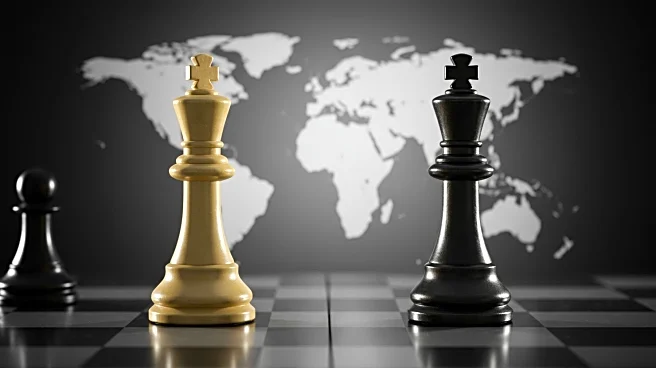What's Happening?
Vladimir Putin and President Trump recently held a meeting in Alaska to discuss the ongoing conflict in Ukraine. The meeting, which lasted nearly three hours, concluded without a peace agreement, although both leaders claimed 'great progress' had been made. President Trump stated that he would brief NATO leaders and Ukraine's President Volodymyr Zelenskyy on the discussions. Putin emphasized the need to address the 'root causes' of the conflict, which he attributes to Ukraine's sovereignty and independence. Ukraine's ambassador to Australia, Vasyl Myroshnychenko, criticized Putin's stance, asserting that the conflict's root cause is Russia's refusal to accept an independent Ukraine. The meeting included U.S. Secretary of State Marco Rubio and Trump's envoy Steve Witkoff, alongside Russian Foreign Minister Sergei Lavrov and foreign policy aide Yuri Ushakov.
Why It's Important?
The meeting between Putin and President Trump is significant as it highlights ongoing international efforts to resolve the conflict in Ukraine, which has persisted since Russia's annexation of Crimea in 2014. The lack of a concrete agreement underscores the complexity of the situation and the challenges in achieving a diplomatic resolution. The conflict has significant implications for European security and international relations, with potential impacts on NATO's strategic positioning and the geopolitical balance in Eastern Europe. The involvement of the U.S. in these discussions reflects its role as a key player in global diplomacy and its commitment to supporting Ukraine's sovereignty.
What's Next?
Following the meeting, President Trump plans to consult with NATO and Ukrainian leaders, which could influence future diplomatic strategies. The international community, particularly European nations, will likely continue to monitor the situation closely, as any resolution could affect regional stability. The ongoing dialogue between the U.S. and Russia may lead to further negotiations, although the path to a lasting peace remains uncertain. Stakeholders, including Ukraine and its allies, will need to remain engaged to ensure their interests are represented in any potential agreements.
Beyond the Headlines
The meeting highlights the broader geopolitical struggle between Russia and Western nations over influence in Eastern Europe. Putin's rhetoric about restoring Russia's former glory suggests a long-term strategy to reassert Russian dominance in the region. This situation raises ethical questions about national sovereignty and the right of countries to self-determination. The conflict also poses challenges for international law and the enforcement of territorial integrity, as Russia's actions in Ukraine have been widely condemned by the international community.









